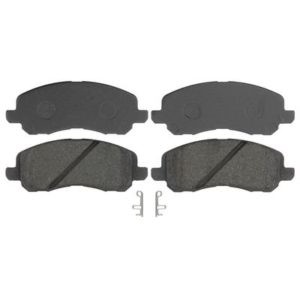Brake maintenance is crucial for safe driving, but it can be a significant expense. Understanding the factors that influence brake replacement costs and knowing how to save money can help you budget effectively. This guide will answer the common question, “How Much For Brakes And Rotors?”, providing a detailed breakdown of expenses and offering helpful tips.
Factors Affecting Brake and Rotor Replacement Costs
Several key factors determine the final cost of replacing your brakes and rotors:
Vehicle Type
The make and model of your car significantly impact the price. Luxury or high-performance vehicles often require specialized, more expensive parts. Larger vehicles like trucks and SUVs typically have larger brake systems, also leading to higher costs.
Brake Pad Material
Different brake pad materials come with varying price tags. Organic pads are the most affordable but wear out quickly. Semi-metallic pads offer a balance of performance and cost, while ceramic pads provide superior longevity, quieter operation, and less dust but come at a premium.
Rotor Condition
Rotors can be resurfaced or replaced. Resurfacing is cheaper but not always possible if the rotors are significantly worn or damaged. High-performance rotors (slotted or drilled) offer better performance but cost more than standard rotors.
Labor Costs
Labor rates vary significantly depending on location and the type of repair shop. Dealerships often charge more than independent mechanics. Complex repairs or rusted components can increase labor time and cost.
Geographic Location
Urban areas typically have higher labor costs than rural areas due to higher overall cost of living.
Estimating Brake and Rotor Replacement Costs: DIY vs. Professional
Professional Brake Replacement Cost
Expect to pay between $115 and $270 per axle for professional brake pad replacement, including parts and labor. Rotor replacement or resurfacing adds another $250 to $500 per axle. A complete brake job (pads, rotors, calipers) can range from $300 to $800, and even exceed $1,000 for some vehicles.
DIY Brake Replacement Cost
DIY replacement significantly reduces costs by eliminating labor charges. Brake pads cost $35-$150, rotors $30-$75 each, and calipers up to $130 each. A complete DIY brake job could cost between $150 and $400.
Saving on Brake and Rotor Replacement Costs
Shop Around for Deals
Compare quotes from multiple repair shops and look for specials or discounts.
Consider Aftermarket Parts
Quality aftermarket parts from reputable brands can offer comparable performance to OEM parts at a lower price.
Regular Brake Maintenance
Routine maintenance, such as brake inspections and fluid flushes, can prevent costly repairs by catching issues early. Simple tasks like checking your brake fluid and visually inspecting your brake pads can make a big difference.
DIY When Possible
If you have the skills and tools, performing simple brake repairs yourself can save significantly on labor costs. Replacing brake pads is a relatively straightforward task for experienced DIYers.
Extending the Life of Your Brakes
Proactive maintenance can help extend the lifespan of your brakes and rotors:
- Gentle Braking: Avoid aggressive driving habits like hard braking and rapid acceleration.
- Regular Inspections: Inspect your brakes regularly, looking for signs of wear and tear.
- Keep Brakes Clean: Regularly clean your brakes to remove debris and prevent rust.
- Flush Brake Fluid: Flush your brake fluid every two to three years to prevent corrosion.
Conclusion
Knowing how much brakes and rotors cost empowers you to make informed decisions about your vehicle maintenance. By understanding the factors influencing cost and employing smart strategies, you can keep your car safe and save money in the long run. Remember, regular maintenance is key to preventing expensive repairs and ensuring optimal braking performance.


